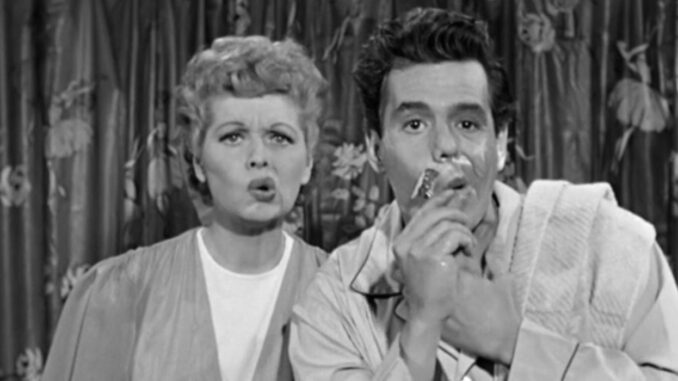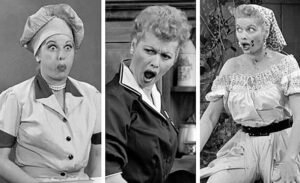
Few shows in television history have had as profound an impact on the medium as I Love Lucy. Not only did it introduce some of the most iconic characters ever seen on TV, but it also pioneered technical innovations that became the industry standard. However, its biggest ripple in the entertainment world started even before the cameras rolled. The show’s casting—particularly of Lucille Ball’s real-life husband, Desi Arnaz—sparked major controversy, but it ultimately set the stage for television to evolve into what it is today.
In this article, we’ll dive deep into how I Love Lucy’s casting choices shook up the TV landscape, faced public and network backlash, and forever altered the course of television history.
The Controversy Behind Desi Arnaz’s Casting

When I Love Lucy was being developed in the early 1950s, no one expected it to be a groundbreaking hit. In fact, many doubted whether it would even get off the ground. The primary reason? Lucille Ball’s insistence that her Cuban-born husband, Desi Arnaz, co-star with her as her on-screen spouse. At the time, Hollywood was not known for its inclusivity, and having an interracial couple on TV was considered risky, if not outright scandalous.
A Cuban in a Leading Role? Unheard of at the Time
Casting Desi Arnaz as Ricky Ricardo was a bold move. The United States was still grappling with issues of race and ethnicity, and having a Cuban man in a leading role on a prime-time television show seemed unimaginable to many. The network, CBS, and sponsors expressed concerns that audiences wouldn’t accept the pairing of a white woman with a Latino man.
Breaking Stereotypes and Rewriting TV Norms
Not only was Arnaz’s casting controversial because of his ethnicity, but he was also portrayed as successful and charismatic—qualities not typically attributed to Latino characters on TV at the time. Historically, Latino characters were relegated to side roles or negative stereotypes, but Ricky Ricardo was portrayed as a savvy businessman, talented musician, and loving husband.
Lucille Ball’s Fight for Desi Arnaz

Lucille Ball wasn’t willing to back down on her casting choice. She fought tooth and nail to have Arnaz cast as her TV husband. Lucille believed that the chemistry she and Desi shared in real life would translate well on-screen, making for a more authentic and compelling show. This decision was a huge gamble, but Ball’s determination paid off, forever altering how casting was approached in Hollywood.
Facing Backlash: Was America Ready?
When the show premiered in 1951, many television critics and executives still weren’t sure if the American public was ready for such a pairing. Some worried it would alienate viewers. Despite these concerns, Lucille Ball and Desi Arnaz were fully confident in the show’s potential. The public’s reaction was eagerly anticipated—and it was a pleasant surprise.
The Audience’s Response: Immediate Success
Contrary to CBS’s and the sponsors’ fears, I Love Lucy became an instant success. Audiences fell in love with the dynamic between Lucy and Ricky, and the show became one of the most-watched programs on television. People were drawn to the genuine chemistry between Lucille Ball and Desi Arnaz, proving that the public was far more open-minded than Hollywood executives had assumed.
How “I Love Lucy” Changed Television
The impact of I Love Lucy’s casting decision wasn’t just about the actors on-screen—it fundamentally changed how TV was made and who could star in it. By casting Desi Arnaz, the show opened doors for greater diversity on television and challenged the long-standing practice of excluding minority actors from leading roles.
The Birth of the Multi-Camera Sitcom
One of the most significant innovations I Love Lucy brought to TV was the multi-camera filming technique, a method that is still widely used today in sitcoms. Desi Arnaz was instrumental in developing this approach, which allowed for more dynamic scenes and a live studio audience. This technique became a television standard and revolutionized how comedy was produced and experienced by viewers.
A New Approach to Syndication
Another major change brought by I Love Lucy was the concept of syndication. Desi Arnaz and Lucille Ball made a shrewd business move by securing ownership of the show’s episodes, which allowed them to re-air I Love Lucy long after its initial run. This changed the economics of television and set a precedent for future shows to profit from reruns.
Breaking Gender and Ethnic Barriers
By casting Desi Arnaz, I Love Lucy pushed boundaries in ways beyond its technical achievements. It opened the door for future television shows to portray interracial couples and diverse families on mainstream media. This paved the way for more inclusive casting decisions in the years to come and expanded the representation of underrepresented communities on television.
Desi Arnaz: More Than Just a Co-Star
Desi Arnaz wasn’t just Lucille Ball’s co-star; he was also a producer and a visionary behind the scenes. His influence helped shape the show into what it became, both in terms of its groundbreaking filming techniques and its business model. Arnaz’s role as an executive producer was a rarity for minority figures in Hollywood at the time, further highlighting the show’s trailblazing nature.
The Legacy of “I Love Lucy”
The legacy of I Love Lucy lives on today. It wasn’t just a popular TV show; it was a cultural milestone that changed television forever. From the way shows are filmed to the kind of characters that can be shown on screen, I Love Lucy set a new standard that television still follows today.
Paving the Way for Future Shows
Without I Love Lucy and its controversial casting decision, TV as we know it would likely look very different. The success of the show proved that diversity and innovation could go hand in hand. It also showed networks that audiences were ready for something new, whether that meant technical advances like multi-camera filming or more inclusive storytelling.
Conclusion
The casting controversy surrounding I Love Lucy may have seemed risky at the time, but it was a risk that paid off in spectacular fashion. By insisting on casting her real-life husband, Desi Arnaz, Lucille Ball not only changed the face of television but also broke new ground in terms of diversity and inclusion. The show’s success proved that audiences were more accepting and open-minded than network executives gave them credit for. Today, I Love Lucy is remembered not only for its comedic genius but also for its role in shaping the television landscape.